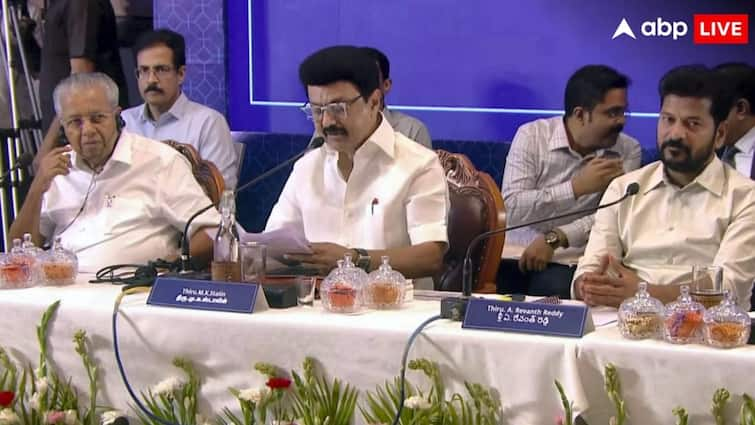Delimitation: Till now only statements were coming from the leaders of South Indian states on the issue of delimitation, but now the fight has started on this issue. A big meeting was held in Chennai today (March 22) on this issue. CM and deputy CM of five states participated in it. Leaders from three other states also attended this meeting. All the public representatives involved in the meeting counted the side effects to their states with delimitation.
This meeting was held under the leadership of Tamil Nadu CM MK Stalin. Kerala Chief Minister P Vijayan, Telangana CM Revanth Reddy, Punjab Chief Minister Bhagwant Mann and Karnataka Deputy CM DK Shivkumar participated in it. Representatives also participated from Odisha opposition party Biju Janata Dal and Andhra Pradesh opposition party YSR-Congress. Everyone opposed delimitation with their facts. who said what? Read here …
Tamil Nadu CM MK Stalin: The delimitation will prove to be extremely bad for those states who strictly implemented family schemes for population control and succeeded. We are not against delimitation. We are in favor of fair delimitation. If there is delimitation according to the population, then our representation will be less in Parliament. If this happens, the center will have to fight to get funds from Sarakar, farmers will be affected, our culture and development will be in danger. Our citizens will lose strength in their own country. Their words will not be heard.
Kerala CM P Vijayan: The BJP government is moving forward on this issue without consultation. This is a step inspired by narrow political interests. If there is delimitation according to the population, then there will be an unexpected increase in seats for the northern states, while the seats of southern states will decrease in Parliament. This will be a profitable deal for the BJP as they have a good influence in the northern states.
Telangana CM Revanth Reddy: Today there is a big challenge before the country. The BJP wants to impose a penalty on the south states through delimitation. We are a country. We respect it, but South India cannot accept this delimitation on the basis of population. This will limit us politically. This will be like punishing us for good work (population control and economic progress). We have to stop the BJP from implementing the delimitation.
Karnataka Deputy CM DK Shivkumar: South India always retained family planning policies and controlled the population. This is why it became a progressive area. We always worked in the national interest. Through delimitation, there is an attempt to decrease the seats of our states. We will not let this happen.
Punjab Chief Minister Bhagwant Maan: Where the BJP has been winning, it wants to increase seats and where it has to face defeat, it wants to reduce seats. We will oppose such delimitation.
BJD chief Naveen Patnaik from Odisha: On the basis of population, delimitation will be unfair to those southern states who control the population through family planning schemes in the country. The delimitation should not be applied on the basis of population. I would advise that after discussing with all the parties in this matter, the Central Government should take some steps on this.
What is the issue of delimitation?
The country has not been delighted since the last 5 decades. After the year 2026, it is considered to be fixed. In the delimitation, the seats of the Lok Sabha will be distributed according to the population. That is, in the state where there is more population, there will be more seats and where there is less population, that state will get less seats.
Looking at the population figures of 2011 itself, there has been a huge increase in population in North Indian states, where the population in South Indian states remained under control. In such a situation, it is clear that the Lok Sabha seats in the states of North India like UP, Bihar, Rajasthan, MP will increase a major increase, while the representation of South Indian states like Tamil Nadu, Kerala, Karnataka, Telangana will be reduced in Parliament. This is the reason that the South Indian states have come face to face with the Center on this issue.

